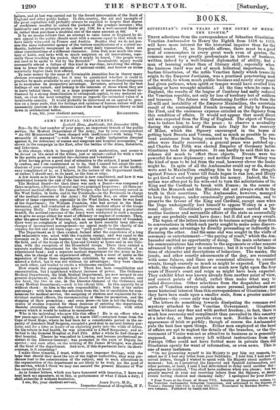ARMY MEDICAL DEPARTMENT.
Lesketh How, Ambleside, 5th .Deeember 1854.
Sra—In the last number of your paper, an important branch of the public service, the Medical Department of the Army, has by your correspondent "An Old Ministerialist' been charged with inefficiency—with being "inexcusably ill managed "—with having "the public indignation directed against it, for deficiency of nurses and surgeons and hospital necessaries," as shown in the campaign in the East, after the battles of the Alma, Baleklava, and Inkerman.
Is this charge, which is brought forward with moderation, and seems to be forced on the mind of the writer, just or unjust—called for with a view to the public, good, or uncalled for—factious and vexatious?
. After having given a good deal of attention to the subject, I must honestly confess, and I am constrained so to do, that I cannot but adopt the conclusions of your correspondent ; and further, that the cause of the inefficiency complained of is, as I believe, in the nature of the Department itself, errather, I should say, in its head, as the fens et origo. A few words as to how the Department is now constituted, and how it was constituted towards the end of the last war, may not be amiss.
The Medical Board—for then there was such a Board—was composed of three members, a Director-General and two principal Inspectors ; all three experienced medical officers : Sir James M'Gregor, who had previously served in the West Indies, in India, and in the Peninsula—in the Peninsula in charge of the medical concerns of the Army ; Sir Charles Ker, an older medical officer of large experience, especially in the West Indies, where he was head ef the department; Sir William Franklin, who had served in the Mediterranean, and had conducted as Inspector the medical affairs of the troops Occupying Sicily. Under these officers, each superintending a particular branch, the medical concerns of the Army were conducted in such a manner as to give no scope either for want of effieiency or neglect of economy. Then, after the great battle of Waterloo, with au unexampled number of wounded, there were no complaints of neglect, such as have recently been rife—no charges of incompetent management—no appeal made to the charity of the country for lint and old linen rage—no " proh pudor l" exclamations.
The Department as it then existed, formed after the experience of a long and exhaustive war, acted with the requisite energy, and was equal to the demands omit. Its main business was the health concerns of the Army in. the field, and of the troops of the Line and Cavalry at home and in. our Colonies, with the exception of the Household troops. There then existed a separate medical department for the Ordnance, under the direction of an. experienced head ; and a separate medical department for the Army in Ire/and, also in charge of an experienced officer. Such a want of union as the separation of these three departments exhibited, by some might be conadered a defect, but it was not without its advantages ; they were checks On each other, and tended to excite a wholesome emulation.
How stands the arrangement now ? There has been consolidation and. concentration, but I apprehend without increase of power. The Ordnance Medical Department, the Irish Medical Department, are now merged in one general department, and the Medical Board has now but one member, and one head, the two in one, in the Director-General of the Ordnance and Army Medical Department,—such is his official title. In this capacity he is without check : on him is the sole responsibility; with him is the entire patronage ; with him rests the selection from the list of candidates for commissions for medical service, the assigning of stations and regiments for individual medical officers, the recommending of these for promotion, and the stopping of their promotion ; and even mote—to him is left the fixing the course of studies required for those desirous of entering the department, thereby overriding our chartered Colleges and Universities ; with other powers which it would be tedious to enumerate. Who is the individual whonow fills this office ? He is an officer who a few years ago—if Irecollect rightly, it wasin 1837—returned home from the Cape of Good Hope, where he had been for a considerable period in the capacity of Assistant Staff Surgeon, occupied a good deal in. natural history pursuits, and for a time as leader of an exploring party into the wilds of Africa. On his return in bad health, he was promoted to a Staff Surgeoncy, and attached to the General Hospital at Fort Pitt. After a while he had charge of that hospital. Thence he was called to London, and became professional assistant to the Director-General; was promoted to the rank of Deputy Inspecter; and soon after, on the retiring of Sir James It'Gregor, was placed at the head of the department. And now, if this department have its shortcomings, is it surprising? I make these remarks, I trust; without any improper feelings, with the hope that should they meet the eye of the higher authorities, they may perchance lead to the consideration of the subject, and to such alterations in the organization of the department as are likely to be truly for the good of the service, which I think we may rest assured the present Minister of War has earnestly at heart.
As in former letters, which you have honoured with insertion, I have not kept back my signature, so in this, in performance of what I think a duty, I shall subscribe it without hesitation.
I am, Sir, your obedient servant, Jonw Davy, M.D., Inspector-General of Hospitals, H
























 Previous page
Previous page